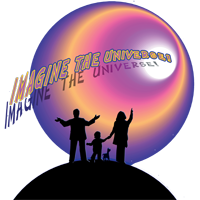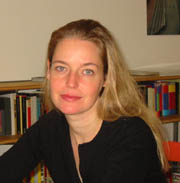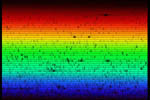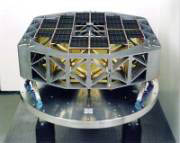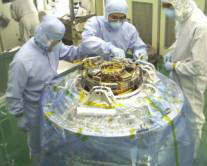Profile: Dr. Jean Cottam
Biography
Jean was born in Fort Belvoir, Virginia, but by the time she started school, her family had moved to Manhattan. She attended an all-girls school there, and it was her 8th grade physical science teacher who first piqued her interest in physics. Now this was not your average physics class. They talked about things like how many edges a six-dimensional solid might have, and they plotted saturation for colors like light blue, and they played with static electricity. Jean loved it.
So after high school, she set off for Harvard to work on an undergraduate degree in physics. But Jean hated it. Classes were too difficult and she had taken too many. When she graduated, she swore she would never go back to physics. So Jean applied to study philosophy in graduate school -- unsuccessfully.
Plan B: Jean had to step back and adjust her career strategy. She knew she loved teaching, so she began with what she knew best: physics and math. But in a surprising turn, after a couple of years of teaching Jean realized that going back to school to study physics would help her become the best teacher she could be. Columbia University welcomed her. It was hard work, but once again physics was fascinating and fun.
The New Physicist
In a short time, her interest in teaching physics started to take a back seat to physics research. For her graduate work, Jean chose to study astrophysics - "a wonderful field with wide open discovery space." And because it blends lab work and theory, she chose experimental astrophysics, where "you get to build things and walk around with a wrench in your back pocket. You apply physics every day, trying to make instruments and understand how they work. Then you get to analyze the data from those instruments."
The XMM-Newton Observatory's high-resolution Reflection Grating Spectrometer (RGS) (on right) was the best project for her because of its development timeline: she could be involved in building the instrument and still be there when the data arrived from space. The RGS is a European Space Agency project with some contributions from US institutions.
Jean was able to help build and test it at Columbia before it was integrated into the spacecraft. She earned her PhD working on the development and characterization of the RGS and the use of it and other spectrometers to study low mass x-ray binaries. (Characterization is the detailed description of the way an instrument works. It's extremely important because scientists must understand the instrument's contribution to the raw data they see and be able to separate its effects from the light of real astrophysical objects.) The XMM-Newton Observatory launched in 1999, and then Jean had the opportunity to characterize it while in orbit. She completed the experience by studying astrophysical objects using RGS data.
Invaluable Experience
Experimental physicists are often divided into instrumentalists and data analysts. The instrumentalists build the satellites and the data analysts use the data from them. Jean is interested in both and thinks that those who have experience in both build the best instruments. With increasingly better technology, instruments can be used to study objects in greater depth and detail, and better understanding of the instrument's strengths and weaknesses allows scientists to push the limits. On the other side, when scientists know what they want to study and also know the difficulties that can be encountered in analyzing data, the instruments can be characterized in a more useful way.
After graduation, Jean's scientific interests drew her to work on the development of the Suzaku X-Ray Spectrometer (XRS) (on left, being inserted into the Dewar), an instrument that uses new technology that complements the Chandra and XMM-Newton spectrometers. Jean came to Goddard on an NRC fellowship in 2001, just as the XRS was being built. As with the RGS instrument, she has been able to participate in characterizing the spectrometer.
Current Work
After two years on an NRC fellowship Jean was hired as a civil servant astrophysicist at Goddard. She continues analyzing RGS data and now has several million data points to sort through!
Jean was also able to continue her work on the XRS and contribute to its calibration on the ground in Japan in the summer of 2004. The spectrometer was integrated into the spacecraft and will be launched from Japan in 2005.
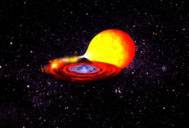
This movie is an artist's concept illustrating a thermonuclear burst consuming an entire neutron star.
(8.7 MB QuickTime Movie)
What is she looking for in the data? Jean is interested in spectroscopy and how it can be used to determine the physical conditions in astronomical objects. Jean was the lead for a team of scientists that probed a bursting neutron star's interior by measuring for the first time how the spectrum of its half-inch atmosphere is distorted by extreme gravitational forces at the surface. Using spectroscopy they are trying to determine what form matter takes at the extraordinary densities in the core of a collapsed neutron star. When the Suzaku/XRS spectrometer starts to provide data, she will add the new data to her studies.
More about this work:
- http://heasarc.gsfc.nasa.gov/docs/objects/heapow/archive/compact_objects/xmm_ns_absorption.html
- http://www.gsfc.nasa.gov/topstory/2004/0908nsmatter.html
Typical Day
Like most other astrophysicists, Jean doesn't have a typical workday. She performs a wide variety of tasks, since she works on both instrument calibration and data analysis from orbiting satellites. Some days she's in the lab setting up instruments and preparing for calibration. Other days she is taking calibration data or analyzing existing data -- mostly at her desk with a computer and notebook. Jean spends a lot of time writing, and there are a lot of meetings and administrative issues involved with flight projects.
Most people in the world have to do hard labor or work at jobs that they don't care about just to get a paycheck. Jean is thrilled to be able to work on satellites that will be launched into space and then use data from them to study objects like neutron stars and black holes. She spends her days thinking about abstract concepts and the wonders in the universe. To Jean, working in astrophysics is a wonderful luxury.
Other Interests
Whether it's on city sidewalks or desert trails, Jean loves being outdoors and walking around. She also loves long road trips and traveling in general. As a kid, Jean and her family used to pile into the car and drive from New York to Utah in the summer to visit her grandparents, aunts, uncles, and cousins. She travels often to see her current extended family, most of whom are on the East coast. And for the first few years that she worked at Goddard, her husband lived in New York to continue his career with contemporary art, so she would visit him there most weekends.
That was "before". Now most of Jean's time outside of work is spent with her new baby and her husband. Since the baby arrived they spend more time in the Washington, D.C. area and go to New York only about once a month. But they still spend a lot of time at museums and art galleries in both cities.
Questions and Answers
If time travel were possible, when and where would you visit, and why?
I'd go to 1962, but only if I could be John Glenn (on left) for the 5 hours in which he first orbited the earth. What an extraordinary view that would have been!
If you weren't a scientist, what would you be?
A teacher (no surprise there!). I love finding ways to explain a scientific concept to someone and seeing their faces the moment when they 'get it'.
If you could invite three people from throughout history to your house for dinner, who would you invite and why?
As long as we go out to eat since I don't really cook...

Robert Millikan
(Credit: AIP Emilio Segre Visual Archives)
Actually, I'd probably not invite known historical characters. I'd invite my grandparents. Most of them died before I was born so I never knew them. I'd like to meet them and find out what they were like.
One of my grandfathers was a teacher and a carpenter in very small towns, but he taught himself physics using books he bought through the mail. He had books by people like Millikan (on right), (who famously measured the charge on the electron back when electrons were still considered highly theoretical). I have books of my grandfather's where the margins are filled with his answers to the problems at the end of the chapters.
As a scientist, you must be in contact with people from all over the world. What is the most unusual question or comment you have ever gotten?
I've worked on two international projects and spent a lot of time in different countries working with people from all over the world. For the most part, there haven't been big differences between cultures, and I've found that it's not always easy to categorize people. In fact, I frequently found myself in meetings with men from Holland and Japan who live in New York, two women from Italy and Greece who live in England, a German living in Switzerland, and an Austrian living in Holland.
Who was your favorite teacher in school? What was this teacher like and how did he/she influence your life?
Impossible to answer. I had so many great teachers. The ones I remember best were smart, articulate and cared about both their students and their subjects. They made me think.
What do you think is the most important technological advance that has occurred in your lifetime?
Disposable diapers?
I suppose I'd have to say the internet. I used to use the library and would Xerox articles from bound journals. I used to have to call or get information by mail for everything from movie schedules and airline tickets to road maps. Now I can get archived data from most satellites or exchange information with foreign colleagues almost instantaneously. I'm not sure that it's always a good thing, but I can get almost everything I need without moving from my desk.
What is the one big dream you have, or the one thing that you would like to accomplish during your lifetime?
When I was in high-school my 'dream' was to become a physicist. I thought it was cool and hard. Now, what I want is to have a balanced life. I want to do work that is challenging and that I enjoy. I want my work to be useful and respected. I want my family to be happy. I want time to enjoy all the other interesting things in life.
Publication Date: October. 2004


